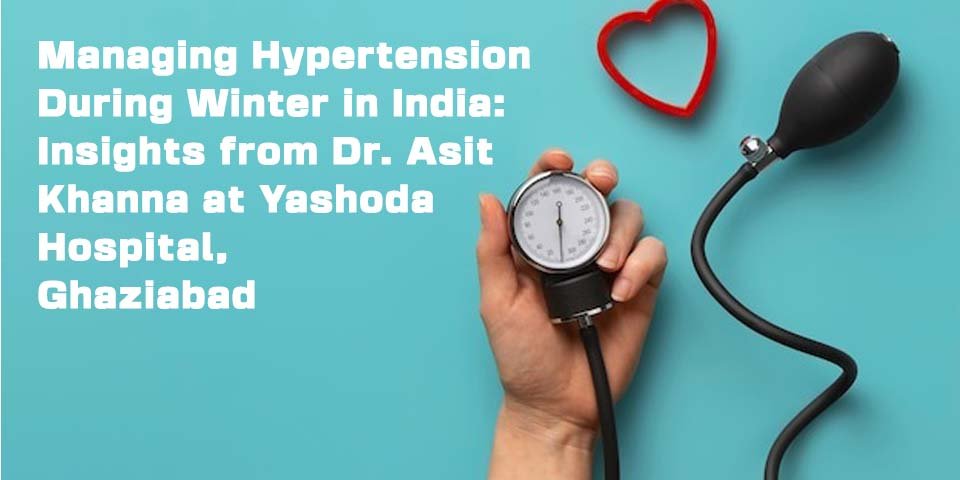
Managing Hypertension During Winter in India: Insights from Dr. Asit Khanna at Yashoda Hospital, Ghaziabad
Hypertension, or high blood pressure, is a major health concern in India, affecting a large segment of the population. The winter season poses additional challenges as colder temperatures can exacerbate the condition, especially among those with pre-existing cardiovascular issues. Dr. Asit Khanna, one of the best cardiologists in Ghaziabad, provides key insights and guidance on managing hypertension during the colder months.
The Indian Context: Hypertension in Winter
In India, winter varies across regions, with northern states experiencing harsh cold while southern areas remain moderately cool. Despite regional differences, winter poses common challenges to managing hypertension:
-
Cold Weather and Vasoconstriction: Lower temperatures lead to narrowing of blood vessels (vasoconstriction), increasing blood pressure.
- Dietary Preferences: Indian diets during winter often include rich, spicy, and calorie-dense foods that can aggravate hypertension.
- Reduced Physical Activity: : Shorter days and chilly weather discourage outdoor activities, leading to sedentary lifestyles.
- Stress Levels: Winter festivals like Christmas and New Year, while joyous, often come with overindulgence and stress that can trigger blood pressure spikes.
The Importance of Cultural and Regional Factors
Understanding the Indian lifestyle is crucial in tailoring hypertension management. For instance:
-
Traditional Indian Foods: High salt intake in pickles, papads, and winter comfort foods like ghee-rich parathas can impact blood pressure.
- Rural vs. Urban Settings:Urban residents often lead sedentary lives, whereas rural populations may struggle with access to healthcare during extreme
Tips for Managing Hypertension in Indian Winters
1. Dietary Adjustments
Indian cuisine can be adapted to promote heart health:
-
Reduce Salt Intake: Avoid excessive use of table salt, pickles, and processed foods.
- Embrace Seasonal Fruits and Vegetables:Winter vegetables like spinach (palak), carrots, and radishes are rich in nutrients and help control blood pressure.
- Heart-Friendly Spices:: Incorporate turmeric, garlic, and fenugreek seeds into meals for their antihypertensive properties.
- Healthy Alternatives:Replace refined flour with whole grains like bajra (pearl millet) and jowar (sorghum), which are traditional Indian winter staples.
Stay Active Indoors
Indian winters, especially in the northern regions, can deter outdoor activities. Opt for:
-
Indoor Exercises: Yoga, an integral part of Indian culture, helps improve circulation and reduce stress.
- Community Activities:Join walking clubs or local groups that meet in parks during warmer daytime hours.
Dress for Warmth
Layering clothes, especially in poorly insulated Indian homes, prevents cold exposure, reducing the risk of vasoconstriction.
Monitor Stress During Festivals
Indian winters are synonymous with festivals, from Diwali to Christmas and Lohri. Manage stress through:
-
Mindfulness Practices: Meditation and deep-breathing techniques can reduce anxiety-induced blood pressure spikes.
- Moderation:Avoid overindulgence in festive foods and alcohol.
Limit Alcohol and Smoking
Culturally, alcohol consumption may increase during festive gatherings. Limit intake, as both alcohol and smoking can worsen hypertension.
Medical Guidance: Why Consult Dr. Asit Khanna?
Dr. Asit Khanna, a leading cardiologist at Yashoda Hospital in Ghaziabad, specializes in managing hypertension and related cardiovascular conditions. Here’s why his expertise stands out:
-
Personalized Care: Dr. Khanna tailors treatment plans that suit individual lifestyles, diets, and preferences common in Indian households.
- Regular Monitoring:State-of-the-art diagnostic tools at Yashoda Hospital ensure accurate monitoring of blood pressure and associated risks.
- Comprehensive Patient Education:Dr. Khanna emphasizes educating patients on lifestyle modifications, medication adherence, and self-monitoring techniques specific to the Indian context.
-
Advanced Treatments: Yashoda Hospital offers access to advanced medical technologies for the management of resistant or secondary hypertension.
Winter-Specific Medical Tips
-
Take Medications as Prescribed: Many patients neglect medications during winter vacations or festive celebrations. Consistency is key.
- Regular Check-ups:Visit your cardiologist periodically to adjust medications based on seasonal variations..
- Control Comorbidities:: Manage diabetes, cholesterol, and obesity, which are common in hypertensive Indian patients.
Why Yashoda Hospital, Ghaziabad?
Located in the heart of Ghaziabad, Yashoda Hospital is a top-tier facility renowned for its exceptional cardiac care. Key highlights include:
-
Expert Team: Led by Dr. Asit Khanna, the cardiology department offers a wealth of experience and specialization.
- Accessible Care:Situated near Delhi NCR, it serves a vast population seeking quality healthcare.
- Comprehensive Services:: From diagnostics to post-treatment care, the hospital ensures holistic management of hypertension.
Conclusion
Hypertension requires proactive management, particularly during Indian winters when environmental and lifestyle changes can affect blood pressure control. By adopting simple lifestyle modifications, staying vigilant, and seeking expert care from specialists like Dr. Asit Khanna at Yashoda Hospital, Ghaziabad,patients can maintain optimal heart health. Whether you’re dealing with seasonal spikes in blood pressure or managing chronic hypertension, personalized strategies rooted in the Indian context can make all the difference.
